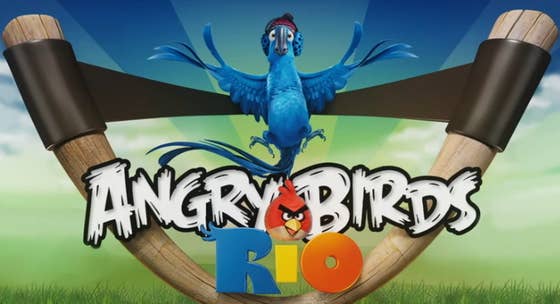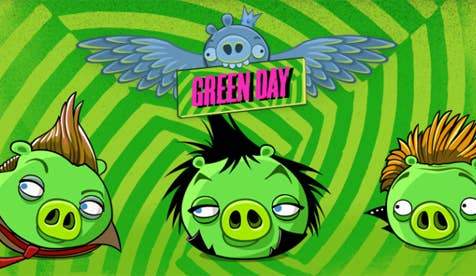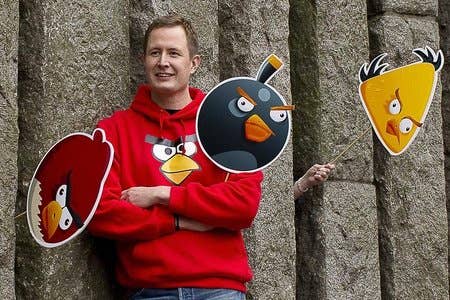Complacency Kills: Managing the world's biggest gaming brand
Rovio's Mikel Hed and Petri Järvilehto talk Angry Birds and Amazing Alex
"Angry Birds has been played by almost everybody," Rovio's CEO Mikael Hed tells me, on a crackly conference call to the developer's home base just outside Helsinki. "The demographic that plays Angry Birds is just so wide that almost every other game will fall into it as well."
He's not just displaying the usual executive hubris, either - although there's a certain, not entirely undeserved self-satisfaction to Rovio's management team. In May, the Angry Birds franchise, across three separate games and several platforms, tipped the scales over one billion downloads, representing a penetration of the public consciousness shared by very few other brands worldwide, let alone within gaming.
few months before that, in October, 2011 Angry Birds was hitting an audience of 30 million players a day, and in March, Angry Birds Space ousted Zynga's $200 million investment, Draw Something, from the number one spot in the App Store. Three days later, it had been downloaded 10 million times. This is a brand that means business.
"We need to be constantly reinventing our games and ourselves...If we were complacent and didn't do that, that would be dangerous. Complacency kills."
Petri Järvilehto, EVP Games, Rovio
The turnaround in Rovio's fortunes which came with Angry Birds is well documented. In the space of a few weeks, the Finnish outfit was transformed from a small concern mobile publisher with 51 fairly unspectacular titles under its belt into the owners of a globally recognised gaming brand, one which would go on to earn the company the sort of revenues which most developers, and some publishers, can only dream of. In 2011, when Rovio granted a brief insight into its finances, they had turned a hugely enviable profit of around $67 million from sales of $106 million in 2011.
The catalyst for all that success was, in Rovio's own admission, partly luck. Right place, right time, right product. Getting the final part of that triumvirate correct is clearly no mean feat, but staying on top of the tree once you're up there is arguably even harder, especially when you're in a market as mutable and mercurial as mobile gaming.
Diversification has been key, with 30 per cent of 2011's revenues generated by licensed goods like the plush toys - expected to pull in $400 million this year alone, plus books, stickers, lunch boxes and hoodies. So pervasive is this 'side business', in fact, that Rovio's EVP of games Petri Järvilehto tells me that only half of the company's workforce is now directly involved in games at all.
But what are they doing with the golden goose?

"I think it's our responsibility and duty to keep the brand fresh," Järvilehto tells me. "If you look at how, earlier this year, we launched Angry Birds Space, where we introduced a completely new gameplay mechanic and environment to play with. We need to be constantly reinventing our games and ourselves, bringing new gameplay experiences, new experiences for the fans out there around the Angry Birds franchise.
"If we were complacent and didn't do that, that would be dangerous. Complacency kills. There are several great examples of that in the gaming sphere, as well as the wider entertainment industry. Look at how Nintendo has managed to keep Mario fresh for over 20 years - they keep bringing new types of gameplay experience to the players, that's something we feel we have to do with Angry Birds as well - we need to always surprise and delight the player."
CEO Mikael Hed agrees, making it clear that, whilst broadening the product offering has helped take some of the pressure off the apps which started it all, they're still the central pillar of the business.
"I'd say that we're fairly confident that Angry Birds has become such a mainstream brand and phenomenon that we can't foresee a future where can't base a very solid and sustainable business on Angry Birds," Hed explains. "Especially as we've also diversified to so many areas.
"In addition to that, the business that we've built around Angry Birds means that it's very easy to build up new franchises as well."
"We are very very careful, of course, and the further we go the more effort we need to put into that, essentially."
CEO Mikael Hed on new franchises
The new boy in Rovio's portfolio, Amazing Alex, has been available for a couple of months, having been purchased lock stock as Casey's Contraptions from Snappy Touch and Mystery Coconut. Neither Hed nor Järvilehto will discuss the sort of numbers it's doing, but they clearly have big plans for it - Hed tells me that the company doesn't take on any franchise lightly.
"We are very very careful, of course, and the further we go the more effort we need to put into that, essentially. We are very very careful. Of course there are expectations based on what we've already done, what's already out there and what we're known for. To some extent that limits what we can do.
"We're very much a company that caters to the entire family. There are certain areas that we'd steer clear of quite strongly. Obvious examples are tobacco and alcohol - vices in general are something which we couldn't be associated with."
"We certainly have a very clear vision on what we feel is right for a Rovio game, how we approach games" adds Järvilehto. "With Alex I think you can see a lot of common elements with the way that Angry Birds was presented. We aim to have extremely high accessibility, anyone should be able to pick up and play the game instantly, yet there should be more depth to the experience than first meets the eye.
"Then, as you can see with what we did with Alex - we spent a huge amount of effort thinking about how we could make that sort of game with the minimal use of text. That's one of the components which affects accessibility in a big way, especially when you're operating in a global market.

"Essentially the way we work it is that whenever we ship a game we set up a live team for the game and their function is to look after that specific game, create more content, more updates - the live teams control the road map for the future of the game. We very much see games as service - when we ship a game, that's the beginning for us.
"That's something you can expect from any Rovio game going forward."
That philosophy is certainly being borne out with Angry Birds itself. Järvilehto tells me that the long awaited console versions of Angry Birds, released as a trilogy pack, will be hitting the shelves "well prior to Christmas", providing "essentially the highest quality compilation versions of the games which have been completely recreated from the ground up to be the best possible living room experience, the best possible high-definition console experience."
It's sales shtick, of course, this is his job, but with plans for DLC, Kinect, Move and Streetpass support all confirmed, Rovio certainly isn't skimping on the resources for the project. And, because solid gold foundations are a nice starting point for experimentation, Petri hints at some new projects in the works.
"Right now we have a pretty good balance with the number of projects which we haven't announced - some of them are going in directions which the fans might not expect, but we also have great development set up with our live teams. I can't comment on the exact numbers in any more detail."
With its new breadth of vision, Rovio is perfectly poised to shift focus as and when it needs to, pivoting away from any shrinking markets and moving towards growth. Hed even hints that, someday, we might be seeing a new brand broached in a sphere which isn't gaming, where the app is a support effort rather than the main attraction - ironically a much more traditional marketing plan.
Whilst that's possible, Hed doesn't see it on the immediate horizon.
"We started as a games company and we remain a very strong games company...I don't see that changing in the near term."
Mikael Hed
"We started as a games company and we remain a very strong games company, so it's a very natural starting point for us," Hed points out.
"I don't see that changing in the near term, but we've also built every other part of our company so that it's possible to one day introduce new IP through other media than games.
"We haven't been in too much of a hurry to bring the company name to the public. I think in the industries we work in we're very well known, then perhaps the consumer brand less so. As we continue doing more products our name will become more well known."
Products is hardly the word. Amongst its other projects, Rovio currently has plans for around 30 theme parks world wide - a market which it would have in common with a company which has inspired Hed to strive for ever greater success.
"We have big ambitions. We're constantly thinking about what, from our starting point, is the biggest thing we can do. Who knows how far we can take that? I don't think Walt Disney knew, when he created Mickey Mouse, just how popular that would become. I think every company should have very high ambitions."
"Who knows how far we can take that? I don't think Walt Disney knew, when he created Mickey Mouse, just how popular that would become."
Mikael Hed
Petri Järvilehto, perhaps sensing a little audacity in that comparison, is keen to play it down a little, but not too much.
"We don't necessarily measure our success by what other people are doing in the field" he explains.
"We like to focus on the things we're doing. We are an ambitious company - there's a strong feeling that we've achieved a lot of great things but at the same time that's only the beginning - there's so much more that we need to be doing in the future. We're off to a good start but let's see what we can build from this."

